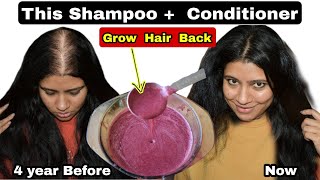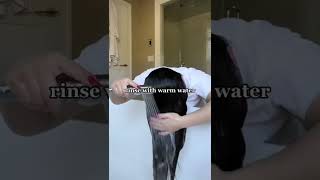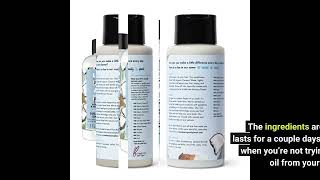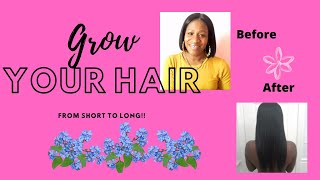Hair Care Basics: Conditioner Edition
As part of my Hair Care Basics series, this video goes in depth about conditioner. I explain the differences between deep conditioners, rinse out/daily conditioners, and leave in conditioners. I teach you how to use them and when, along with explaining how to determine what type of conditioner you need for your hair type.
Favorite hair tools:
Detangling brush: https://amzn.to/2WUu9IL
Styling brush, can't find the one I use but it is similar to a denman 9 row: https://amzn.to/3DOAead
Diffuser: https://amzn.to/3yVnhHQ
Alligator clips: https://amzn.to/3h9OKj2
Disclaimer: some links may be affiliate links. If you make a purchase through these links, I earn a small commission that helps support this channel.
One on one virtual hair coaching sessions! Details found here: https://ko-fi.com/curlychelle/commissi...
Please be sure to also check out my other hair care basics videos, including shampoo basics.
Follow me on Social Media:
Instagram: @curlychelle547
Facebook: https://www.facebook.com/curlychelle
#haircarebasics #curlyhaircare #curlyhairstylist #naturallycurly #haircareforbeginners
Hi welcome or welcome back to my channel, i'm michelle, i'm a licensed hair stylist with over 20 years of experience and on this channel i use those years of experience to help you have healthy, happy hair. Are you confused about conditioners about how often you use them? What type to use do you need a deep tree, deep conditioner? Do you need a leave-in conditioner? What kind of conditioners do you need and how often should you be using them? If these are burning questions plaguing your mind, then today's video might be for you, because i will be going into the different types of conditioners and how to use them and how often you use them. The different types of conditioners there are are the deep conditioners, and then there is your daily or your rinse out conditioners. These would be the conditioners that you use typically after you shampoo, and then there is the leave-in conditioner. So the big difference between the three here is that a deep conditioner is like your regular conditioner on steroids. So a deep conditioner gets deep down in and really helps your hair. If it's needing a little extra help, if it's dry or damaged or parched or something it needs a little bit more protein, it needs a little bit more moisture. It just basically needs a little extra love, you're going to want to use a deep conditioner to help repair or to add the moisture back into your hair and with a regular conditioner or rinse out conditioner or a daily conditioner. Whatever. However, you see it being termed that is the type of conditioner that you would use every time that you wash in order to condition your hair after it's been cleansed. Unless, of course, you use a cleansing conditioner, which is a different kind of conditioner, and i covered that a little bit in my shampoo basics, video, which i will put a card up here, so that you can go ahead and check that one out. But with a cleansing conditioner, that's where it's got a little bit of cleanser in there it's mostly conditioner, but it's got a little bit of cleanser in there. So it can cleanse your scalp and condition your hair all at the same time, and you can use a cleansing conditioner in the place of a shampoo and daily conditioner or rinse out conditioner. Once in a while. I wouldn't recommend only using cleansing conditioners, because your scalp does need a really good cleanse from time to time. However, alternating it with the shampoo different shampoos could be beneficial and then the leave-in conditioner is just like. It suggests it's a conditioner that you leave in your hair with the deep conditioners, there's a ton of different deep conditioners and treatments. There'S protein there's moisture and i am going to create a video all about hair treatments with deep conditioners put in there, but a deep conditioner is not something you're going to need to use every single time you wash your hair. This is something that you're going to need when your hair needs the little extra bit of love. Like i mentioned before it's dry or it's damaged, it needs a little repair and you'll see them. Labeled as like repair conditioners, repair, masks or moisturizing is usually the biggest one for getting moisture. Anything that says, repair or fortifying or strengthening is going to be something that's heavier on protein and then the moisturizing conditioners are usually just labeled, moisture, conditioners or moisture. Something it'll indicate something that hydrates your hair, so moisturizing or hydrating it'll be marketed as how often you need to use this is actually dependent on your hair. If you have shiny, healthy hair, that gives you hardly any problems at all. It'S manageable. It doesn't take much to detangle it it's in great shape, and you know you just you don't have any issues. Well then yay, you have some pretty great hair and that's awesome you're doing a great job. Also, you don't need to use a deep conditioner. Hardly ever just once, you happen to notice that you do start having problems or it's getting a little bit dry or maybe, as you head into the winter climates um, and it's a little bit drier where you're at in the winter versus the rest of the year. Maybe you might need a little bit of help then, but otherwise, if your hair is technically pretty healthy, you're not going to need a deep conditioner on a regular basis, you are only going to use it as needed now, if you have really parched or dry damaged, Hair, like i mentioned before, you're, definitely going to want to use it more often and how often basically depends on how your hair feels. There is no hard and fast rules here and definitely don't go by your curl type, because your curl type does not dictate how often it needs to be conditioned that is dictated by the condition of your hair, so you're going to have to go by feel. If it's feeling pretty dry pretty brittle, it's probably going to need some moisture and maybe even a little bit of protein, especially if you've bleached your hair or you're. A high lift blonde and you're you're going to need a little extra protein to get some strength and structure back into your hair and, like i said, i'm going to go in depth onto deep conditioners and hair treatments in a different video but good rule of thumb. If your hair is pretty healthy and not giving you any issues, then you don't need to use a deep conditioner. Very often you don't. I mean i can't even sit here and say that you would need it once a month because you might not. You might be able to go a couple of months without needing to deep conditioner your hair, if your hair is on the healthy side, whereas if you have very damaged hair, you're, probably going to have to use a deep conditioner more frequently. However, as for how how frequently you need it, i can't tell you that, because i can't see you, i can't feel your hair, it could be once a week. It could be twice a week. It could be once a month. It all depends on the condition of your hair and what it's feeling like, since i am going to do, that other video on deep conditioners, we're going to move on now to your daily conditioners or your rinse out conditioners, the ones that you use when you wash Your hair, and then you condition afterwards so, as i mentioned before, with the deep conditioners there is strengthening or repairing or fortifying if it says anything like that, these are the ones that tend to contain protein and they're good for all of those things for strengthening for Repairing and fortifying, but because it's a rinse out conditioner that you can use every time that you shampoo, it's not gon na, have a very heavy-duty dose of the protein like a deep conditioner would so fortifying. Repairing or strengthening shampoos are really good for hair. That is weak and damaged uh from what i had like what i had mentioned above with bleached hair or high lift hair high lift blondes, especially usually, do very well with getting a healthy dose of protein. In order to add that strength and structure back to their hair, that's been taken out from the lifting process or if you have hair that typically does really well with protein. My hair is not remotely damaged it's very healthy. However, it does do fairly well with protein. So now we've covered the protein containing ones, we'll talk about the moisture ones. They'Re, usually can they're usually marketed, like i said before, with the uh deep conditioner as moisturizing or hydrating and they're great for dry hair, and for those of us who have curly hair. We tend to have dry hair to begin with, just because our hair is curly and that's a characteristic that tends to go with curly hair. So moisture is usually a really good bet for using with curly, hair or even wavy hair, and it can be used by pretty much all hair types, because even straight hair can need moisture in their hair, especially if it might be straight and really coarse and low. Porosity and it really needs to get that moisture in there. These can be good for that type of hair as well, and the types of moisturizing conditioners you're going to want to go for kind of depends on the texture of your hair and the health of your hair. So if your hair again is really healthy, you are not going to need something that is really really heavy moisturizing. You might be able to get away with something. That'S a little bit lighter weight than something that's heavier, and especially, if you have really fine hair you're going to want something that puts the moisture in there, but doesn't weigh it down. So you're definitely going to want to look for lightweight formulations. The other thing that you're going to want to have - and that usually shows up in moisturizing conditioners - is they tend to have a really good amount of slip, and that is something that is really good for when you are detangling in the shower, you want to make Sure that you are able to easily bring your brush or the wide tooth comb through your hair, so that you're not getting it caught and ripping hair out or breaking it as you're trying to detangle. So that's something to keep in mind too, with the moisturizing, not that the protein heavy ones don't have good slip. They just don't usually have as good of slip as the ones that are more moisturizing, so another type of conditioner would be the volumizing, and this is really good for fine hair hair. That'S easily weighed down, there's still moisture in volumizing shampoos, just not as much so it'll be something that's lighter weight that keeps it from getting weighed down and getting too heavy with the conditioner okay. So now we've gone over the three most common types of conditioners and how they will be marketed, we'll talk about how often you use them, which is every time that you shampoo just so that you can help restore moisture back into your hair after the shampooing process. The shampooing process can sometimes lift your cuticle a little bit. Getting your hair wet will lift your cuticle a little bit because the hair shaft swells from having the water in it and sealing it back down with the conditioner will help smooth and flatten that out. So you don't have a roughed up appearance and your hair doesn't feel dry. It feels soft and pliable and manageable, and the other thing to keep in mind. You don't need to rinse any of this out with cold water. Cold water does not seal your cuticle down the way that it is commonly believed to. That is the job of your conditioner. So if you want shiny hair, that's smoothed down, use your conditioner. That'S all you need! You don't need to stand in the shower. Freezing your butt off putting cold water on it, because it's not going to help it's there's nothing in cold water that makes it seal down it's the ph that makes the cuticle lay a little bit flatter and that's what the conditioner has is the ph to help Smooth that down and bring it back down where it belongs. So some good tips to remember when you're using your rinse out conditioner, is to apply to your mid lengths and ends focusing specifically on your ends. This is typically nothing that you want to put on your scalp unless, of course, the conditioner on the label. It says that it can be used on the scalp and can help soothe the scalp. However, most of the time you're going to want to keep it away from your scalp, because you just want to focus on keeping the hair, that's a little bit drier, which tends to be your mid shafts down to your ends. You want to focus on those more with your conditioner, rather than the scalp. Putting it up at the scalp can cause irritation. If it's not meant to be there or it can cause your hair to get really limp and lifeless and not have a lot of volume. You'Ll have hair, that's stuck to your head, so definitely keep it off of your scalp. Another reason to keep it off of your scalp is that if you have oily hair, it can cause your hair to look greasy if you're, putting conditioner on top of your oily or scalp, and your hair will get oily or faster if you're, putting conditioner up on Your scalp and while you have your conditioner in your hair when you're in the shower, this is a really good time to be brushing or combing through your hair, like i mentioned before, with the slip it's great to have conditioners that have a really good slip so That you can definitely do this detangling with a conditioner in that's got some really good slip is the safest way to detangle your hair without causing breakage or without pulling your hair out, and it also serves the second function of being able to distribute the conditioner throughout Your hair, so that you make sure it's nice and evenly distributed, and you don't have a blob here - and you missed some strands over here. So just remember when you have your conditioner in your hair, while you're in the shower. That is a good time to use a wide tooth comb to detangle it, or there are lots of detangling brushes out these days grab one of those use those to detangle. This is a great time for that. In fact, it's probably the best time to do that. So the next conditioner we're going to talk about is your leave-in conditioner. So what is a leave-in conditioner? So a leave-in conditioner is something that is not rinsed out, just as the name suggests it gets left in your hair and it can help prepare your hair for the rest of your styling process. It can also help to balance the moisture and protein in your hair as well, so, if you're, using something that's ultra moisturizing as a rinse out conditioner and it feels like your hair is soft enough. You don't really need any more. Maybe you need a little bit of something else, but not really the moisture you can put in a leave-in. That'S got a little bit more protein and kind of balance that out or the reverse. If you use a conditioner, that's heavy on the protein and now you're feeling like you, need a little bit of moisture a little bit of slip a little bit of manageability a little bit more softness you can put in a leave-in conditioner. That is got that has a lot of moisture or you can get one that has a good balance of both to just keep your hair balanced after you've washed and conditioned your hair, and this then sets your sets you up for having a really good, balanced, wash And style day over, you might be wondering: do you need to use a leave-in conditioner, not necessarily if you have hair that is very healthy and it does just fine with using a regular rinse out conditioner, you probably don't need to use a leave-in conditioner or maybe Just use one that is a little bit lighter weight that uh just helps a little bit with some slip and detangling, and that's about it. You may not need anything above and beyond that for your hair. If your hair is very fine, you might want to stay away from leave-in conditioners. Now there are leave-in conditioners that are a little bit lighter and can be used for finer, hair or hair. That'S easily weighed down, and you can certainly try one of those, but for the most part, if your hair is super, fine and literally anything can cause it to weigh down. Then i would avoid using a leave-in conditioner on your hair. Instead, if you feel like you need a little bit of something in there, but you're afraid to use a leave-in conditioner, because you don't want it to weigh your hair down, i would suggest not rinsing all of your regular conditioner out of your hair um. One of the things that i did when i used to work behind the chair is, i would sometimes leave when i was rinsing out the conditioner. I would sometimes leave just a little bit of the conditioner in the hair, just so that it would help me comb through it, as i was cutting their hair. So i wasn't getting caught on tangles or getting stuck on anything, and that is certainly something that you can definitely do. If you have very easily weighed down, hair is to just leave a small amount in there, so something to kind of look for and that that amount can be hard to like determine when you're feeling it. You have to go by feel, and so you as you're feeling your hair, like it, usually feels seaweedy slimy with conditioner in it. When it's fully covered in conditioner. It feels you can feel the conditioner in there, but, as you start to rinse it out, it starts to feel like just your regular hair. So, just before you get to the point where it feels like you, don't have any slip in it leave a little bit of that slip in there just a tiny bit just enough so that you can easily run your fingers through it without getting stuck, and it's Got enough slip for that, but not so much that it is very slimy and slippery and seaweedy type texture so, and that's something that you can experiment with too to determine how much you need to leave in there in order for it to work well, for you And leaving that little bit of conditioner is most certainly safe to do because you are leaving in just a small small small amount of that conditioner. It'S not like you're, just leaving that conditioner in your hair and not rinsing it back out um. Otherwise, for the most part, how long you need to leave your conditioner in when you're in the shower your rinse out conditioner? That is all depending on what it says on the packaging leave it in for as long as it says. If you feel like you need a little bit extra, but you don't necessarily need to use um a deep conditioner. I would suggest go ahead and leaving it in for just a few minutes longer, just to add a little bit of extra something it's not going to go as deep as a deep conditioner, but it'll give you a little extra help if you want to - and that's Completely fine as well, however, i would not suggest sleeping in any of these conditioners unless, of course, the package says to do so. Sleeping with wet hair can cause scalp issues. It can cause fungus. The other thing that can happen when you're sleeping with conditioners and stuff on your hair - that's not meant to be left on your hair - is that it can get on your scalp and cause contact dermatitis. If you find that you happen to be sensitive to something in that conditioner, so it's just best not to sleep in any conditioners, unless of course, it actually says to do so. However, i still would be a little bit leery of that one of the things that you just don't want to do. Is you don't want to be sleeping with wet hair? You don't want your hair to stay wet in a warm environment for very long, because that is the perfect breeding ground for bacteria yeast and fungus. Okay. So, to recap: we have deep conditioners, which are to be used when needed, only your regular conditioners or daily conditioners, which are to be used when you shampoo your hair and, along with that, goes the cleansing conditioners, which you can alternate with a regular shampoo and conditioner Combo and then you have the leave-in conditioners, which you leave in your hair, and that is something that, if it's something that you do need, you can use every time that you wash your hair after you've finished, washing conditioning and rinsing all of that out. So hopefully, this video helped clear things up for you regarding conditioners what types of conditioners, how often to use them, whether or not you need to use them and how to use them. So if you like this video, please give me a thumbs up if you'd like to see more content like this, please go ahead and subscribe. Make sure you hit that notification bell. So you know when my next videos come out and if you have any questions comments, any videos that you'd like to see or you'd just like to say, hi go ahead and leave me a comment down below and as always thanks for watching bye.





Comments
Hilary B: What's your opinion on the 'squish to condish'?